【广东学导练】2015-2016学年英语牛津深圳版八年级下册课件Unit 2 language(共24张PPT)
文档属性
| 名称 | 【广东学导练】2015-2016学年英语牛津深圳版八年级下册课件Unit 2 language(共24张PPT) | 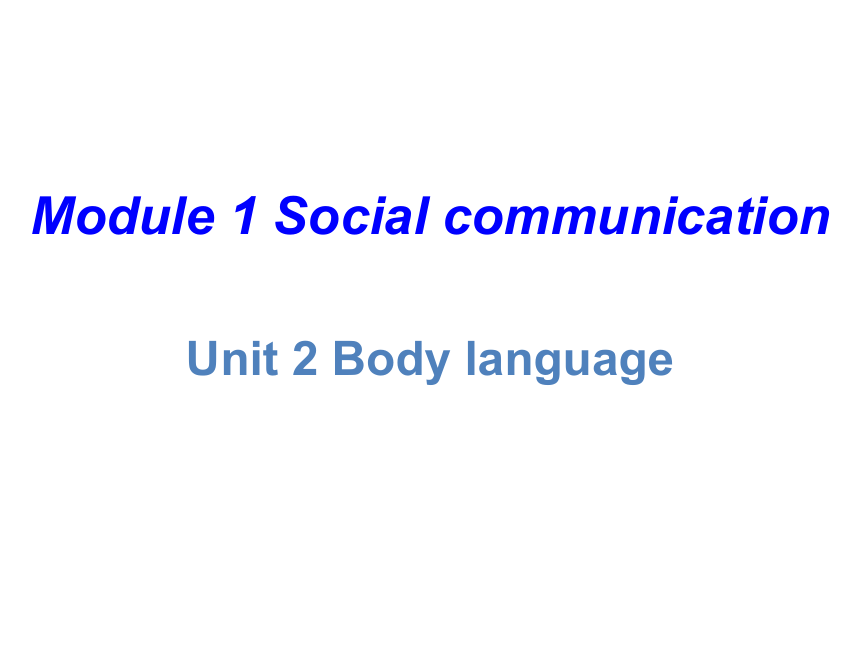 | |
| 格式 | zip | ||
| 文件大小 | 94.0KB | ||
| 资源类型 | 教案 | ||
| 版本资源 | 牛津深圳版 | ||
| 科目 | 英语 | ||
| 更新时间 | 2016-07-05 19:58:52 | ||
图片预览

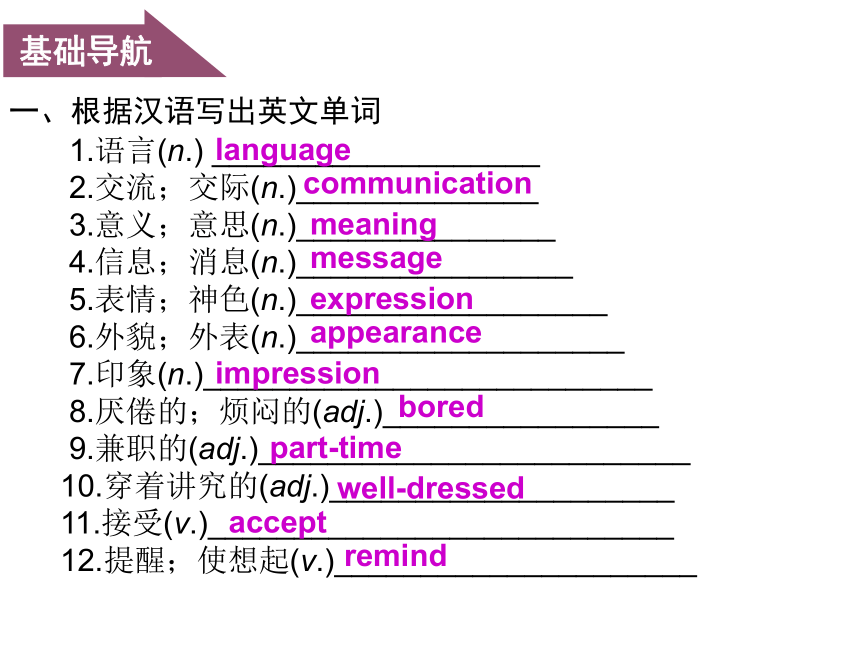
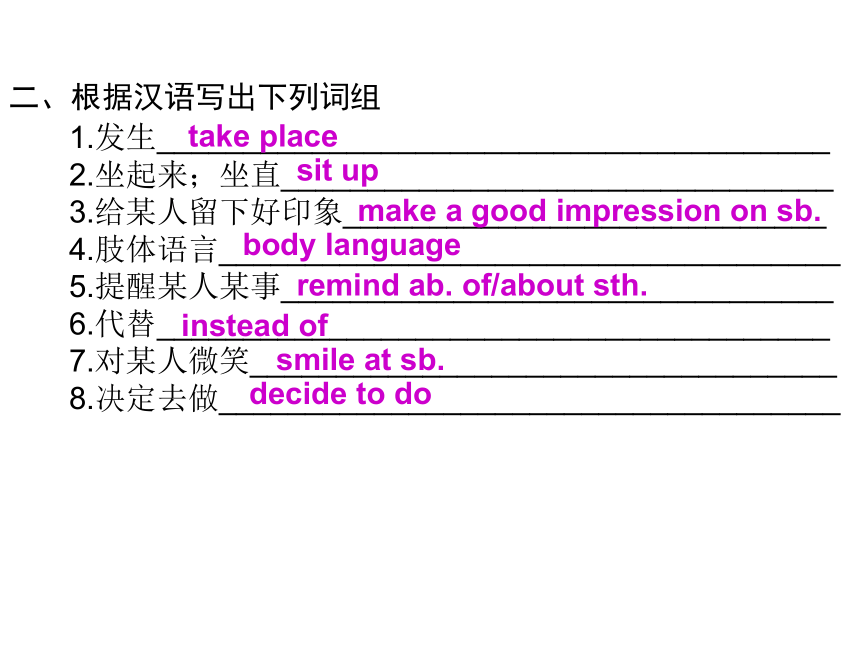
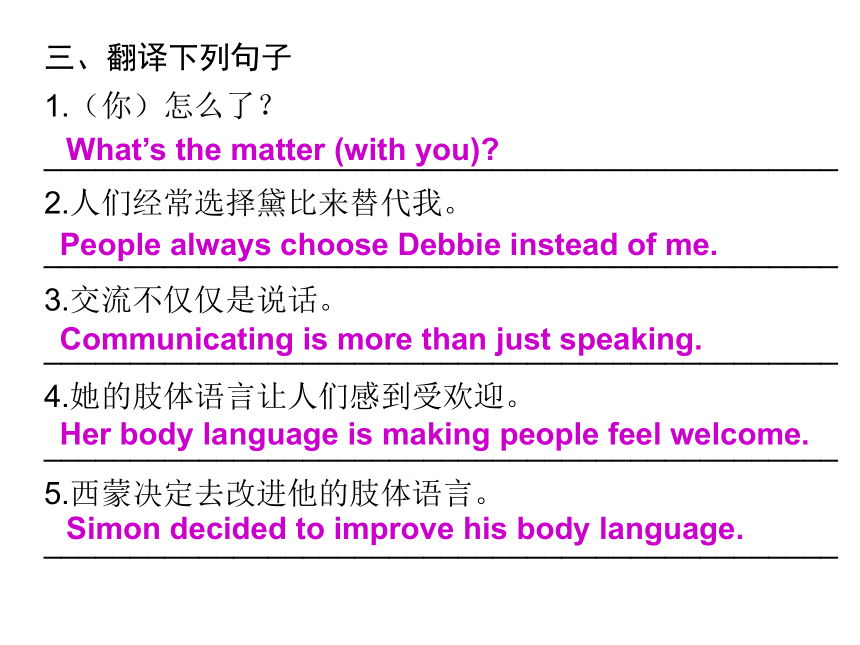
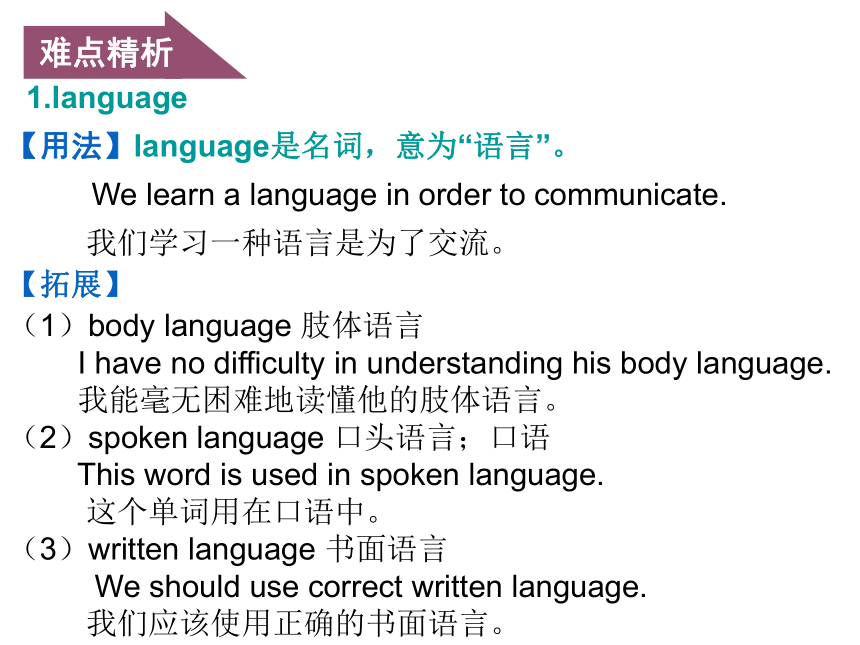
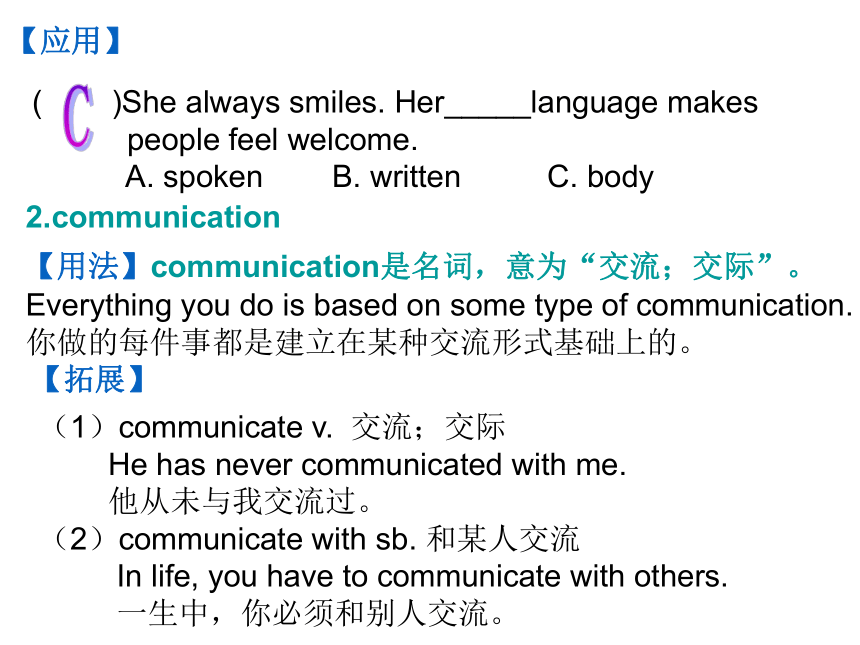
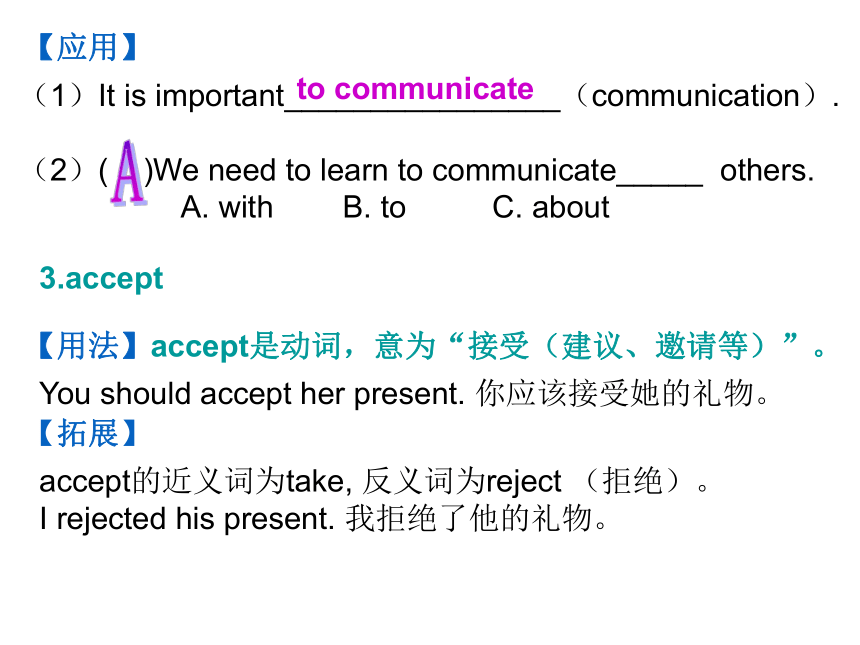
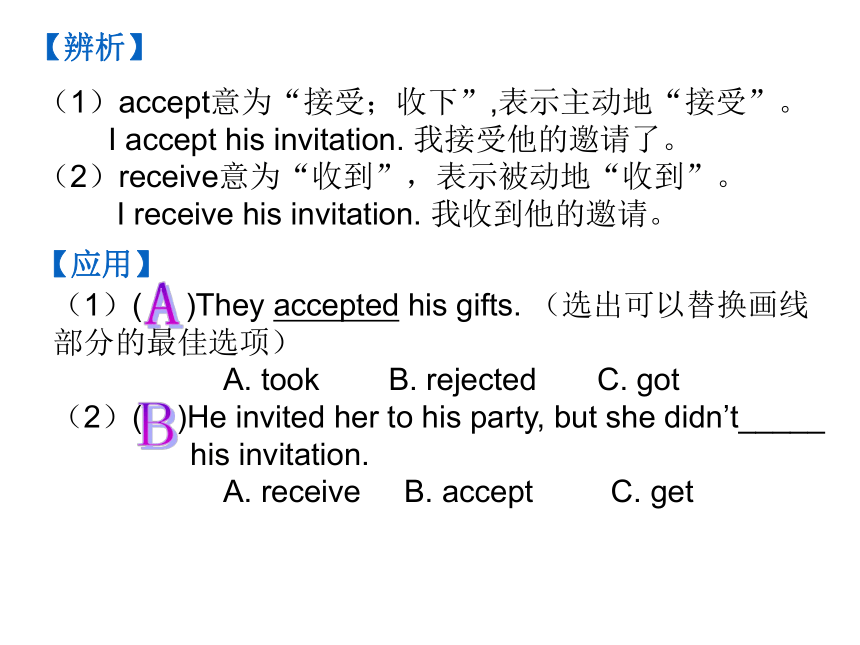
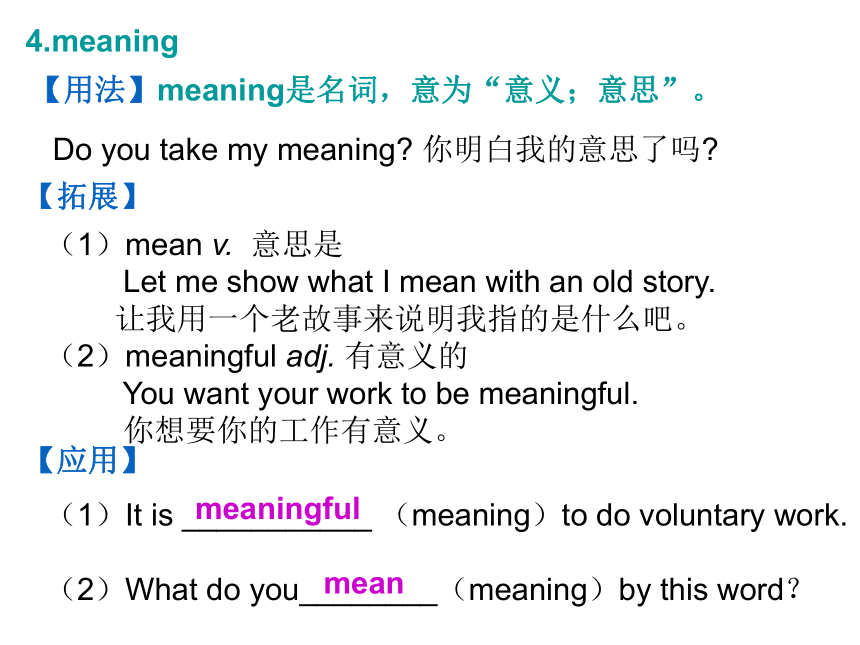
文档简介
课件24张PPT。Unit 2 Body language
Module 1 Social communication
基础导航一、根据汉语写出英文单词
1.语言(n.) ___________________
2.交流;交际(n.)______________
3.意义;意思(n.)_______________
4.信息;消息(n.)________________
5.表情;神色(n.)__________________
6.外貌;外表(n.)___________________
7.印象(n.)__________________________
8.厌倦的;烦闷的(adj.)________________
9.兼职的(adj.)_________________________
10.穿着讲究的(adj.)____________________
11.接受(v.)___________________________
12.提醒;使想起(v.)_____________________
language communication meaning messageexpressionappearanceimpressionboredpart-timewell-dressedacceptremind二、根据汉语写出下列词组
1.发生_______________________________________
2.坐起来;坐直________________________________
3.给某人留下好印象____________________________
4.肢体语言____________________________________
5.提醒某人某事________________________________
6.代替_______________________________________
7.对某人微笑__________________________________
8.决定去做____________________________________ take placesit upmake a good impression on sb.body languageremind ab. of/about sth.instead ofsmile at sb.decide to do三、翻译下列句子
1.(你)怎么了?
______________________________________________
2.人们经常选择黛比来替代我。
______________________________________________
3.交流不仅仅是说话。
______________________________________________
4.她的肢体语言让人们感到受欢迎。
______________________________________________
5.西蒙决定去改进他的肢体语言。
______________________________________________
What’s the matter (with you)?People always choose Debbie instead of me.Communicating is more than just speaking.Her body language is making people feel welcome.Simon decided to improve his body language.难点精析 1.language
【用法】language是名词,意为“语言”。
We learn a language in order to communicate.
我们学习一种语言是为了交流。【拓展】(1)body language 肢体语言
I have no difficulty in understanding his body language.
我能毫无困难地读懂他的肢体语言。
(2)spoken language 口头语言;口语
This word is used in spoken language.
这个单词用在口语中。
(3)written language 书面语言
We should use correct written language.
我们应该使用正确的书面语言。
【应用】( )She always smiles. Her_____language makes
people feel welcome.
A. spoken B. written C. bodyC2.communication【用法】communication是名词,意为“交流;交际”。Everything you do is based on some type of communication. 你做的每件事都是建立在某种交流形式基础上的。
【拓展】(1)communicate v. 交流;交际
He has never communicated with me.
他从未与我交流过。
(2)communicate with sb. 和某人交流
In life, you have to communicate with others.
一生中,你必须和别人交流。
【应用】(1)It is important________________(communication).
(2)( )We need to learn to communicate_____ others.
A. with B. to C. aboutto communicateA3.accept【用法】accept是动词,意为“接受(建议、邀请等)”。You should accept her present. 你应该接受她的礼物。【拓展】accept的近义词为take, 反义词为reject (拒绝)。
I rejected his present. 我拒绝了他的礼物。【辨析】(1)accept意为“接受;收下”,表示主动地“接受”。
I accept his invitation. 我接受他的邀请了。
(2)receive意为“收到”,表示被动地“收到”。
I receive his invitation. 我收到他的邀请。【应用】(1)( )They accepted his gifts. (选出可以替换画线部分的最佳选项)
A. took B. rejected C. got
(2)( )He invited her to his party, but she didn’t_____
his invitation.
A. receive B. accept C. getAB4.meaning【用法】meaning是名词,意为“意义;意思”。Do you take my meaning? 你明白我的意思了吗?
【拓展】(1)mean v. 意思是
Let me show what I mean with an old story.
让我用一个老故事来说明我指的是什么吧。
(2)meaningful adj. 有意义的
You want your work to be meaningful.
你想要你的工作有意义。【应用】(1)It is ___________ (meaning)to do voluntary work.
(2)What do you________(meaning)by this word?meaningful mean 5.message【用法】message是名词,意为“(书面或口头的)信息;消息”。He sent a message to her. 他发了一条信息给她。【拓展】(1)leave a message留言;留口信
Please leave a message on my voicemail.
请给我的语音信箱留言。
(2)take a message(for sb.)捎口信(给某人)
Can I take a message for you?
我可以帮你捎个口信吗?【应用】( )He is not in. Can I_____ a message for you?
A. leave B. take C. sendB6.bored【用法】bored是形容词,意为“(对某人/某物)厌倦的;
烦闷的;无聊的”。
【拓展】(1)boring adj. 令人感到无聊的
This party is boring. 这种宴会令人感到无聊。
(2)bored近义词为uninterested
He feels bored.=He feels uninterested. 他感到无聊。 【应用】(1)( )His speech is so long and everyone is bored.
(选出可以替换画线部分的最佳选项)
A. has interest B. has no interest C. feels interested
(2)The film is________(bored). Bboring7.appearance【用法】appearance是名词,意为“外貌;外表;出现”。Why do we care so much about appearance? 为什么我们如此在意(我们的)外表呢?
【拓展】(1)appear v. 出现;似乎;显得
A woman suddenly appeared in the doorway.
一个女人突然出现在门口。
The old man appears to be in good health.
这位老人显得十分健康。
(2)disappear v. 消失
She disappeared down the corridor.
她消失在走廊尽头。
【应用】(1)( )We should not judge a person by his______ .
A. appear B. disappear C. appearance
(2)He___________ (appearance)and never came back.
Cdisappeared 8.hold【用法】hold是动词,意为“保持;举行”,过去式和过去
分词分别是held,held。 【拓展】(1)hold up(one’s head)保持(头)抬起来
If you do well, you can hold up your head.
如果你做得好,你可以抬起你的头。
(2)hold on 坚持,等一会
Hold on, please. 请等一会。
(3)hold a party=organize a party举行聚会
I want to hold/organize a party for my college roommates.
我想举行一个大学室友的聚会。
【应用】 ( )They held a money’raising activity for the children
in need. (选出可以替换画线部分的最佳选项)
A. organized B. raise C. carriedA9.remind【用法】remind是动词,意为“提醒;使想起”。You remind me. I have another idea now. 你提醒了我。我现在又有一个主意了。【拓展】(1)remind sb. of/about sth.提醒某人某事
In case I forget, please remind me about/of it. 万
一我忘了,就请提醒我一下。
(2)remind sb. to do sth.提醒某人做某事
Remind her to come earlier tomorrow morning.
提醒她明天上午早点过来。
(3)remind that... 提醒……
He reminds that tomorrow is her birthday.
他提醒明天是她的生日。【应用】(1)He came to remind me_______(buy)a book
for him.
(2)( )She came to remind me______ her birthday.
A. on B. for C. of
to buyC语法梳理语法精讲动名词 我们用动名词(v.+’ing)来表示动作或活动,通常为不可数,前面不能加a 或an,谓语动词用第三人称单数。动名词可以有自己的宾语。
Communicating is more than just speaking.
交流不仅仅是说话。
He loves reading books. 他爱看书。1.动名词的构成:v.+’ing。2.作主语。我们可以用动名词作句子的主语。
Smiling shows that you are happy. 微笑表明你很高兴。
Dancing is her favourite hobby. 跳舞是她最喜欢的爱好。
3.作宾语。我们可以用动名词放在动词或介词后作宾语。
Debbie enjoys smiling and always looks friendly.
黛比喜欢微笑所以总是看起来很友好。
Debbie is good at communicating. 黛比擅长交流。
I am looking forward to going to Beijing. 我盼望去北京。4.动名词有关用法归纳。直击中考( )1. —Would you mind______in the dinning hall?
—Of course not. (2014宜宾)
A. not to smoke B. not smoking
C. smoke D. not smoke
( )2. —What about a rest?
—Let’s go for a walk. (2014邵阳)
A. to take B. take C. taking
( )3. —Can you finish these books before 10 o’clock?
—Yes, I can. (2014雅安)
A. to read B. read C. reads D. reading
BCD写作乐园话题二 留言条
【常用词组】1.Sep. 10 九月十号
2.hi/hello Tom你好汤姆
3.remind sb. about/of sth.提醒某人某事
4.hold a game 举行一场比赛
5.on the playground 在操场上
6.play against和……比赛
7.at 8:30 a.m.在上午八点半
8.on time准时
9.forget to do忘记去做
10.remember to do记得去做
11.meet sb.和某人见面
【精彩句型】
1.This is to remind you about our basketball game tomorrow morning. 这是提醒你明天上午我们的篮球比赛的事。
2.We will play against Xinhua Middle School.
我们将和新华中学打比赛。
3.The game will start at 8:30 a.m..比赛将在早上八点半开始。
4.Don’t forget to bring your basketball shoes and clothes.
别忘记带你的篮球鞋和衣服来。
5.I will meet you at the school gate at 8 o’clock a.m..
我们明天早上八点在学校门口碰面。
6.See you there! 那里见!【短文写作】
假设你是Simon, 今天是9月16号,你去Tom家告诉他明天和新华中学打篮球比赛的事情,但他不在家。请你给他写一张留言条。要求70-80词。
提示:
1.比赛时间为明天早上8:30;
2.比赛地点在我们学校操场;
3.记得带好篮球鞋和衣服;
4.早上8:00在校门口碰面。
___________________________________________________________________________________________________________________________________________________________________________________________________________________________________________________________________________________________________________________________
【范文赏析】
A short message
Sep. 16
Hi Tom,
This is to remind you about our basketball game tomorrow morning.
Our school will hold a basketball game on our school playground tomorrow morning. We will play against Xinhua Middle School. The game will start at 8:30 a.m., so you must be on time. I will meet you at the school gate at 8 o’clock a.m. Don’t be late.
See you there!
Simon谢谢欣赏!
1.语言(n.) ___________________
2.交流;交际(n.)______________
3.意义;意思(n.)_______________
4.信息;消息(n.)________________
5.表情;神色(n.)__________________
6.外貌;外表(n.)___________________
7.印象(n.)__________________________
8.厌倦的;烦闷的(adj.)________________
9.兼职的(adj.)_________________________
10.穿着讲究的(adj.)____________________
11.接受(v.)___________________________
12.提醒;使想起(v.)_____________________
language communication meaning messageexpressionappearanceimpressionboredpart-timewell-dressedacceptremind二、根据汉语写出下列词组
1.发生_______________________________________
2.坐起来;坐直________________________________
3.给某人留下好印象____________________________
4.肢体语言____________________________________
5.提醒某人某事________________________________
6.代替_______________________________________
7.对某人微笑__________________________________
8.决定去做____________________________________ take placesit upmake a good impression on sb.body languageremind ab. of/about sth.instead ofsmile at sb.decide to do三、翻译下列句子
1.(你)怎么了?
______________________________________________
2.人们经常选择黛比来替代我。
______________________________________________
3.交流不仅仅是说话。
______________________________________________
4.她的肢体语言让人们感到受欢迎。
______________________________________________
5.西蒙决定去改进他的肢体语言。
______________________________________________
What’s the matter (with you)?People always choose Debbie instead of me.Communicating is more than just speaking.Her body language is making people feel welcome.Simon decided to improve his body language.难点精析 1.language
【用法】language是名词,意为“语言”。
We learn a language in order to communicate.
我们学习一种语言是为了交流。【拓展】(1)body language 肢体语言
I have no difficulty in understanding his body language.
我能毫无困难地读懂他的肢体语言。
(2)spoken language 口头语言;口语
This word is used in spoken language.
这个单词用在口语中。
(3)written language 书面语言
We should use correct written language.
我们应该使用正确的书面语言。
【应用】( )She always smiles. Her_____language makes
people feel welcome.
A. spoken B. written C. bodyC2.communication【用法】communication是名词,意为“交流;交际”。Everything you do is based on some type of communication. 你做的每件事都是建立在某种交流形式基础上的。
【拓展】(1)communicate v. 交流;交际
He has never communicated with me.
他从未与我交流过。
(2)communicate with sb. 和某人交流
In life, you have to communicate with others.
一生中,你必须和别人交流。
【应用】(1)It is important________________(communication).
(2)( )We need to learn to communicate_____ others.
A. with B. to C. aboutto communicateA3.accept【用法】accept是动词,意为“接受(建议、邀请等)”。You should accept her present. 你应该接受她的礼物。【拓展】accept的近义词为take, 反义词为reject (拒绝)。
I rejected his present. 我拒绝了他的礼物。【辨析】(1)accept意为“接受;收下”,表示主动地“接受”。
I accept his invitation. 我接受他的邀请了。
(2)receive意为“收到”,表示被动地“收到”。
I receive his invitation. 我收到他的邀请。【应用】(1)( )They accepted his gifts. (选出可以替换画线部分的最佳选项)
A. took B. rejected C. got
(2)( )He invited her to his party, but she didn’t_____
his invitation.
A. receive B. accept C. getAB4.meaning【用法】meaning是名词,意为“意义;意思”。Do you take my meaning? 你明白我的意思了吗?
【拓展】(1)mean v. 意思是
Let me show what I mean with an old story.
让我用一个老故事来说明我指的是什么吧。
(2)meaningful adj. 有意义的
You want your work to be meaningful.
你想要你的工作有意义。【应用】(1)It is ___________ (meaning)to do voluntary work.
(2)What do you________(meaning)by this word?meaningful mean 5.message【用法】message是名词,意为“(书面或口头的)信息;消息”。He sent a message to her. 他发了一条信息给她。【拓展】(1)leave a message留言;留口信
Please leave a message on my voicemail.
请给我的语音信箱留言。
(2)take a message(for sb.)捎口信(给某人)
Can I take a message for you?
我可以帮你捎个口信吗?【应用】( )He is not in. Can I_____ a message for you?
A. leave B. take C. sendB6.bored【用法】bored是形容词,意为“(对某人/某物)厌倦的;
烦闷的;无聊的”。
【拓展】(1)boring adj. 令人感到无聊的
This party is boring. 这种宴会令人感到无聊。
(2)bored近义词为uninterested
He feels bored.=He feels uninterested. 他感到无聊。 【应用】(1)( )His speech is so long and everyone is bored.
(选出可以替换画线部分的最佳选项)
A. has interest B. has no interest C. feels interested
(2)The film is________(bored). Bboring7.appearance【用法】appearance是名词,意为“外貌;外表;出现”。Why do we care so much about appearance? 为什么我们如此在意(我们的)外表呢?
【拓展】(1)appear v. 出现;似乎;显得
A woman suddenly appeared in the doorway.
一个女人突然出现在门口。
The old man appears to be in good health.
这位老人显得十分健康。
(2)disappear v. 消失
She disappeared down the corridor.
她消失在走廊尽头。
【应用】(1)( )We should not judge a person by his______ .
A. appear B. disappear C. appearance
(2)He___________ (appearance)and never came back.
Cdisappeared 8.hold【用法】hold是动词,意为“保持;举行”,过去式和过去
分词分别是held,held。 【拓展】(1)hold up(one’s head)保持(头)抬起来
If you do well, you can hold up your head.
如果你做得好,你可以抬起你的头。
(2)hold on 坚持,等一会
Hold on, please. 请等一会。
(3)hold a party=organize a party举行聚会
I want to hold/organize a party for my college roommates.
我想举行一个大学室友的聚会。
【应用】 ( )They held a money’raising activity for the children
in need. (选出可以替换画线部分的最佳选项)
A. organized B. raise C. carriedA9.remind【用法】remind是动词,意为“提醒;使想起”。You remind me. I have another idea now. 你提醒了我。我现在又有一个主意了。【拓展】(1)remind sb. of/about sth.提醒某人某事
In case I forget, please remind me about/of it. 万
一我忘了,就请提醒我一下。
(2)remind sb. to do sth.提醒某人做某事
Remind her to come earlier tomorrow morning.
提醒她明天上午早点过来。
(3)remind that... 提醒……
He reminds that tomorrow is her birthday.
他提醒明天是她的生日。【应用】(1)He came to remind me_______(buy)a book
for him.
(2)( )She came to remind me______ her birthday.
A. on B. for C. of
to buyC语法梳理语法精讲动名词 我们用动名词(v.+’ing)来表示动作或活动,通常为不可数,前面不能加a 或an,谓语动词用第三人称单数。动名词可以有自己的宾语。
Communicating is more than just speaking.
交流不仅仅是说话。
He loves reading books. 他爱看书。1.动名词的构成:v.+’ing。2.作主语。我们可以用动名词作句子的主语。
Smiling shows that you are happy. 微笑表明你很高兴。
Dancing is her favourite hobby. 跳舞是她最喜欢的爱好。
3.作宾语。我们可以用动名词放在动词或介词后作宾语。
Debbie enjoys smiling and always looks friendly.
黛比喜欢微笑所以总是看起来很友好。
Debbie is good at communicating. 黛比擅长交流。
I am looking forward to going to Beijing. 我盼望去北京。4.动名词有关用法归纳。直击中考( )1. —Would you mind______in the dinning hall?
—Of course not. (2014宜宾)
A. not to smoke B. not smoking
C. smoke D. not smoke
( )2. —What about a rest?
—Let’s go for a walk. (2014邵阳)
A. to take B. take C. taking
( )3. —Can you finish these books before 10 o’clock?
—Yes, I can. (2014雅安)
A. to read B. read C. reads D. reading
BCD写作乐园话题二 留言条
【常用词组】1.Sep. 10 九月十号
2.hi/hello Tom你好汤姆
3.remind sb. about/of sth.提醒某人某事
4.hold a game 举行一场比赛
5.on the playground 在操场上
6.play against和……比赛
7.at 8:30 a.m.在上午八点半
8.on time准时
9.forget to do忘记去做
10.remember to do记得去做
11.meet sb.和某人见面
【精彩句型】
1.This is to remind you about our basketball game tomorrow morning. 这是提醒你明天上午我们的篮球比赛的事。
2.We will play against Xinhua Middle School.
我们将和新华中学打比赛。
3.The game will start at 8:30 a.m..比赛将在早上八点半开始。
4.Don’t forget to bring your basketball shoes and clothes.
别忘记带你的篮球鞋和衣服来。
5.I will meet you at the school gate at 8 o’clock a.m..
我们明天早上八点在学校门口碰面。
6.See you there! 那里见!【短文写作】
假设你是Simon, 今天是9月16号,你去Tom家告诉他明天和新华中学打篮球比赛的事情,但他不在家。请你给他写一张留言条。要求70-80词。
提示:
1.比赛时间为明天早上8:30;
2.比赛地点在我们学校操场;
3.记得带好篮球鞋和衣服;
4.早上8:00在校门口碰面。
___________________________________________________________________________________________________________________________________________________________________________________________________________________________________________________________________________________________________________________________
【范文赏析】
A short message
Sep. 16
Hi Tom,
This is to remind you about our basketball game tomorrow morning.
Our school will hold a basketball game on our school playground tomorrow morning. We will play against Xinhua Middle School. The game will start at 8:30 a.m., so you must be on time. I will meet you at the school gate at 8 o’clock a.m. Don’t be late.
See you there!
Simon谢谢欣赏!
同课章节目录
